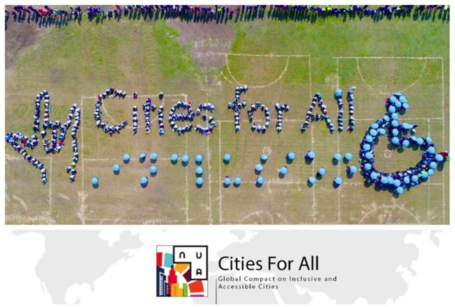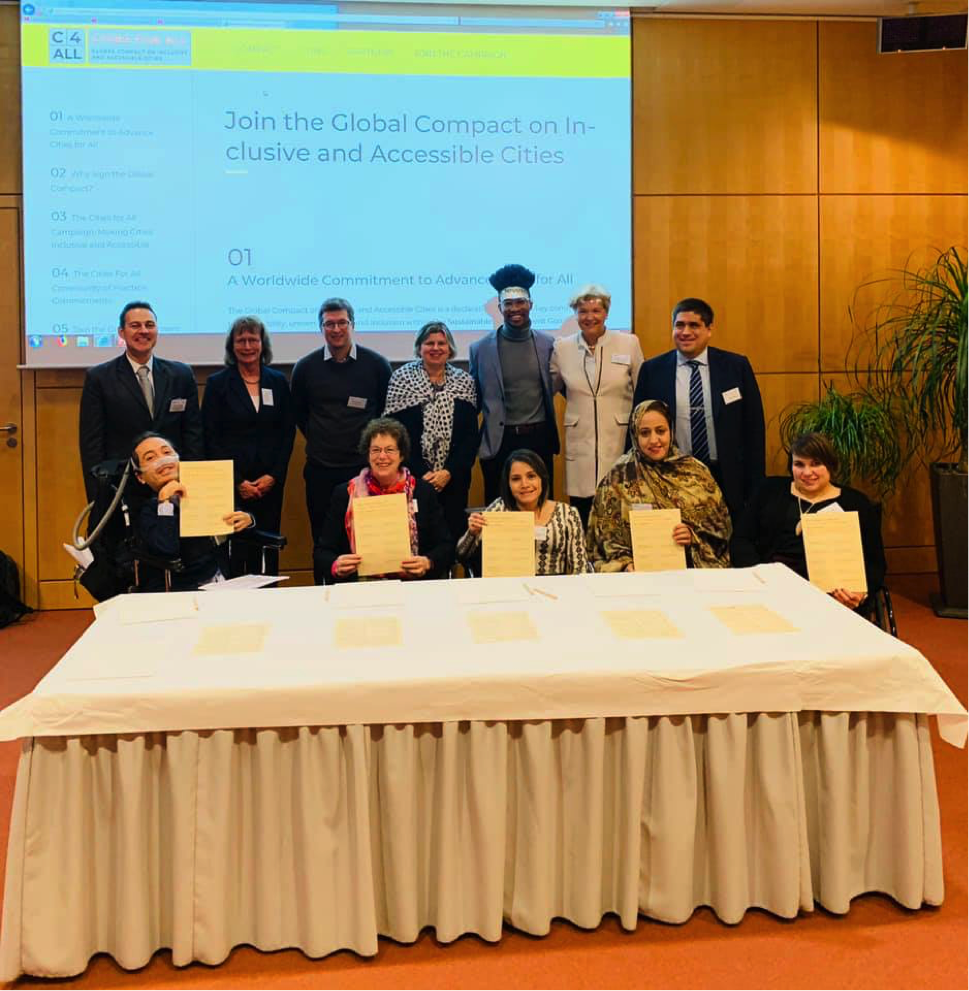
On Monday December 3, 2018, World Enabled and the German Federal Ministry of Economic Cooperation and Development (BMZ) hosted a celebration of the International Day of Persons with Disabilities and the historic launch of the Cities For All global campaign and the Global Compact on Inclusive and Accessible Cities.
This historic event gathered city leaders from New York City, São Paulo, Chicago, Curitiba, Berlin, Amman, and Laayoune for a signing ceremony signifying their commitment towards inclusive and accessible cities for persons with disabilities and older persons.
World Enabled launched the Cities For All Compact and Campaign with two strong global networks, United Cities and Local Governments (UCLG), a global organization with a membership of 4,000 mayors from around the world, and The Global Network for Disability Inclusive & Accessible Urban Development (DIAUD). The launch event was co-sponsored by UN Habitat, German Development Cooperation (BMZ and GIZ), Alianza Smart LATAM, the Office of the UN Special Envoy on Accessibility, and the Office of the UN Special Rapporteur on Disability.
Dr. Heike Kuhn, Head of the BMZ’s Division for Human rights, Gender Equality, and Inclusion of Persons with Disabilities, opened the event. In her speech, she expressed her full support for the Cities For All Campaign and how this initiative aligns Germany’s participation in the United Nations’ Sustainable Development Goals, the New Urban Agenda, and the Convention on the Rights of Persons with Disabilities. Ensuring an Inclusive Urban Future was the topic of a speech given by Ms. Cornelia Henricksson Policy Officer of BMZ, who served as co-master of ceremony alongside Dr. Victor Pineda, President of World Enabled. Attending were more than 50 participants from human rights, international development, and smart cities, as well as in urban planning, policy and design. The BMZ headquarters community room, the top floor of the organization’s building, was the location of this historical event.
The Global Compact on Inclusive and Accessible Cities is a declaration that aligns key commitments to accessibility, universal design, and inclusion within The United Nations Sustainable Development Goals, United Nations New Urban Agenda, United Nations Convention on the Rights of Persons with Disabilities and the WHO’s Age-friendly Cities and Communities Initiative. It affirms the rights of 1 billion women, men, girls and boys with disabilities and  the increasing share of the global population aged 60 or older that experience barriers to their equitable participation in society. This global call for action lays at the core of the Cities For All campaign (#Cities4All).
the increasing share of the global population aged 60 or older that experience barriers to their equitable participation in society. This global call for action lays at the core of the Cities For All campaign (#Cities4All).
Mr. Benjamin Dard, CBM International’s Technical Advisor for Accessibility and Universal Design and also representative for the Disability Inclusive and Accessible Urban Development (DIAUD) Network, addressed the importance for persons with disabilities and older persons to have “seats at the table” during decision making and policy and planning discussions.
Dr. Katherine Kline, Recording Secretary and Co-Chair General Assembly of Partners Older Persons, emphasized the often forgotten ageing population and the need to include them in planning of cities.
Representing the Mayors’ Office of Persons with Disabilities were Commissioner Karen Tamely from the City of Chicago and Deputy Commissioner Marinalva Da Silva Cruz from the City of Sao Paulo. Both talked about what their cities are doing about inclusive and accessible cities and how being the founding signatories of this Compact will support and advance what Chicago and Sao Paulo are already doing. Ms. Lalla Salka Zaiougay, the Deputy Mayor of the City of Laayoune, shared similar stories. Chief Executive Officer of the World Blind Union (WBU), Mr. Jose Viera spoke on behalf of WBU in expressing the importance of the Compact and his commitment to actively engage and contribute along with the other partners.
Ms. Maimunah Sharif, Executive Director of United Nations Habitat provided a message of strong support was read at the ceremony and she is also one of the founding signatories. the Founding signatories provided key messages on the topic of sustaining partnership for implementing the Global Sustainable Development Goals and ensuring that people with disabilities and older persons are not left behind. Ms. Emilia Saiz, Secretary General of United Cities and Local Government (UCLG), Mr. Victor Calise, Commissioner in the Mayor’s Office of Persons with Disabilities in New York City, and Mr. Rafael Greca, Mayor of the City of Curitiba all stressed the significance of this launch and the need to develop a global community of practice on accessibility.
A signing ceremony, a call-to-action for city leaders to join the Compact, and the announcement of the new website for Cities 4 All (www.cities4all) concluded the event. A dinner reception on a boat on the Spree River was hosted by the BMZ. To date, 25 cities are in the process of signing the Global Compact.
The Compact does not create new commitments or requirements, but rather aligns existing commitments that cities have to existing international human rights and development frameworks. In the concluding remarks Dr. Victor Pineda stated, “This is an important milestone for the more than 550 million persons with disabilities around the world and a growing older population living in cities.
By 2050, close to 70% of the world population will live in cities. Half of all persons with disabilities and older persons around the world now live in towns and cities, and these groups are estimated to represent over 2 billion persons in cities worldwide by 2050. City leaders have the opportunity to make cities age-friendly and ensure that cities are accessible for people with disabilities and for all older persons by leveraging innovations in technology and enforcing global accessibility standards. Dr. Pineda concluded by saying, “The Cities For All Global Campaign will drive forth the principles laid out in the Global Compact on Inclusive and Accessible Cities. Our next task is to develop with our city partners an implementation framework and a community of practice that puts these principles into practice.”
Source: World Enabled
- Download the press release










